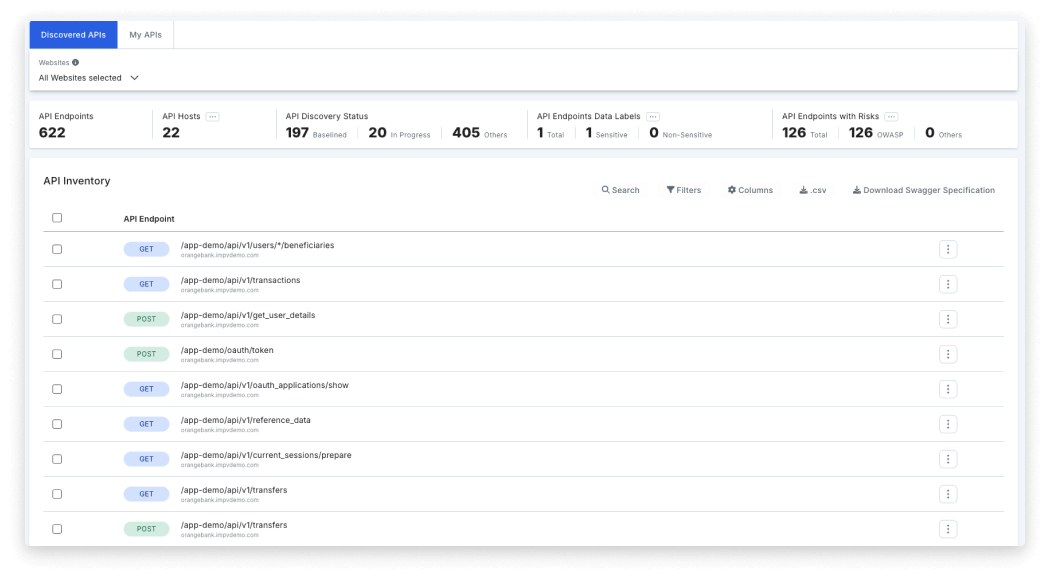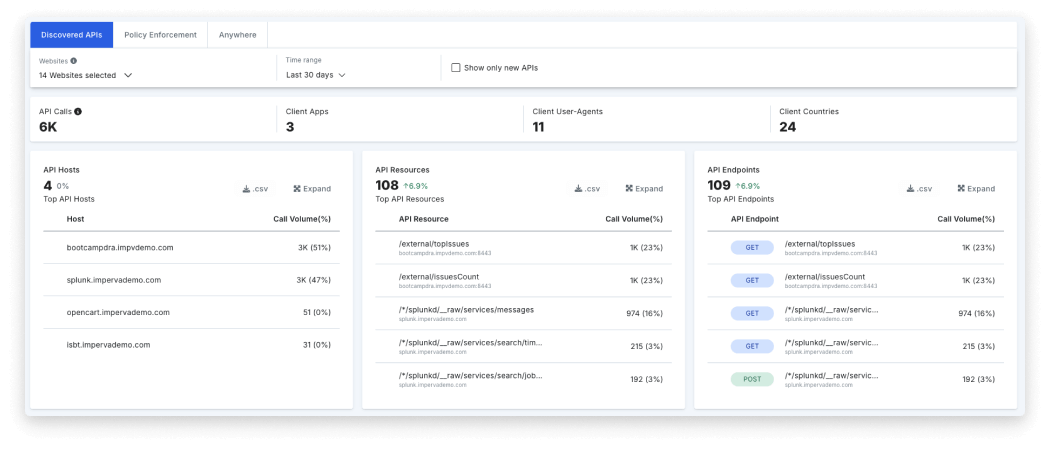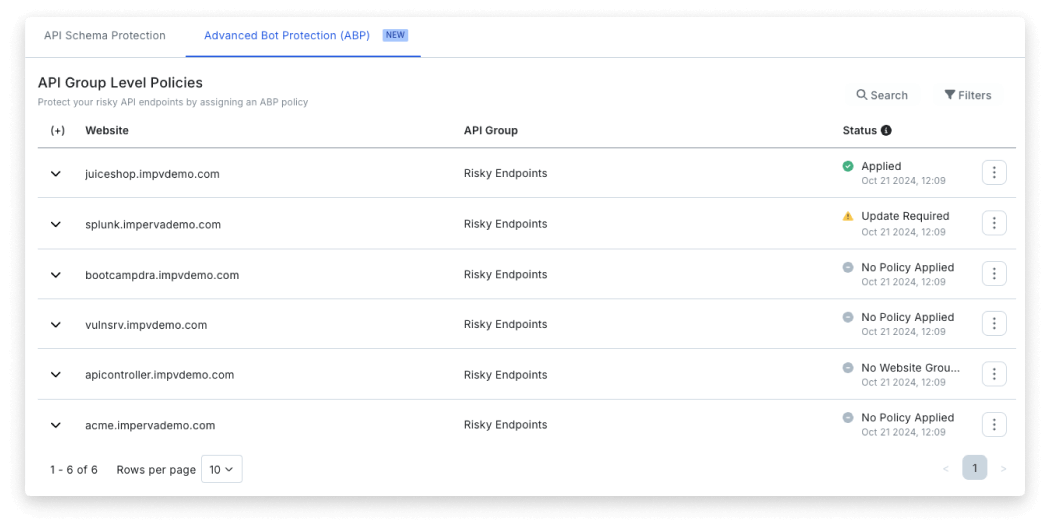Discover and classify all APIs
Unknown or forgotten APIs can be exploited by attackers due to their hidden vulnerabilities, making them a serious risk to your infrastructure if left unchecked.
Imperva API Security provides robust protection against API attacks and business logic abuse, seamlessly integrating with WAF and Bot Protection for comprehensive coverage.
Imperva provides continuous discovery of all public, private, and shadow APIs, ensuring no gaps in your API landscape. By thoroughly classifying and assessing risk, we protect your entire API inventory and mitigate vulnerabilities, safeguarding even the most hidden and vulnerable endpoints from potential threats.
Learn moreProtect your APIs wherever they're deployed—whether behind a cloud WAF, on-premise, in hybrid environments, or across east-west and north-south traffic. Imperva API Security ensures robust protection for your APIs, no matter the setup or location of your applications.
Learn moreSeamlessly integrating with your WAF, Imperva extends protection beyond APIs to your entire application architecture. This unified approach delivers comprehensive, layered security that’s unmatched in the industry.
Learn more





Once activated, Imperva API Security continuously discovers and monitors APIs across environments, including shadow APIs. It tracks changes, detects design flaws, and identifies vulnerabilities to prevent API attacks.

Imperva API Security conducts ongoing risk assessments to identify design flaws and vulnerabilities associated with the OWASP API Security Top 10. This capability empowers organizations to proactively detect and remediate security gaps, ensuring robust protection for their APIs and minimizing potential risks.

Imperva API Security and Advanced Bot Protection work together to safeguard APIs from automated threats. They provide visibility into sensitive APIs, detect bot attacks, and mitigate risks through tailored Imperva Advanced Bot Protection policies, ensuring robust protection for your business logic against abuse from automated threats.

Imperva API Security offers flexible management options for diverse environments. Choose cloud-managed for external cloud integration or self-managed for full control without integration with external cloud services. Deployment options include agent-based or agentless setups, supporting cloud WAF, microservices, encrypted applications, and network-layer monitoring, ensuring comprehensive protection for all API traffic across any architecture.

Imperva API Security integrates seamlessly with industry-leading tools like Kong, Mulesoft, Azure APIM, Apigee, and F5, simplifying deployment and management. It ensures thorough API traffic inspection across all environments while enhancing flexibility and control through API gateways, proxies, and load balancers, supporting both encrypted applications and microservices.
Imperva API Security provides continuous protection of all APIs using deep discovery and classification to detect all public, private and shadow APIs. It also protects against business logic attacks and many more of the OWASP API Top Ten threats. The easy-to-deploy solution empowers security teams to implement a positive API security model.
Unknown or forgotten APIs can be exploited by attackers due to their hidden vulnerabilities, making them a serious risk to your infrastructure if left unchecked.
API Security conducts thorough risk assessments on vulnerable API endpoints, including those susceptible to abuse. This proactive approach supports a positive security posture by identifying potential weaknesses and enabling organizations to mitigate risks effectively.
Imperva API Security continuously discovers all public, private, and shadow APIs, while WAF, DDoS, and Bot Protection block potential surveillance attacks that could lead to API abuse and data exfiltration.
API business logic flaws, including Broken Object Level Authorization (BOLA), expose applications to risk. Imperva API Security protects against these vulnerabilities and defends against the OWASP API Security Top 10 threats.
APIs are essential for modern applications, enabling data exchange between services. However, if not properly secured, APIs can be vulnerable to attacks, data breaches, and manipulation of business logic. API security protects against these risks, ensuring data integrity, safeguarding user information, and maintaining seamless service availability for businesses and customers. Find out more.
Imperva API Security offers flexible deployment options, including an API Security Add-On for Imperva Cloud WAF users, Cloud-Managed API Security through the Imperva Cloud WAF console and Self-Managed API Security via a local management console. This ensures seamless integration in cloud, on-premises, or hybrid environments.
Business logic abuse occurs when attackers manipulate the legitimate functionality of an API to achieve malicious goals, such as bypassing security controls or exploiting flaws in the application’s logic.
Imperva API Security continuously discovers, classifies, and assesses all APIs, focusing on vulnerabilities like Broken Object Level Authorization (BOLA). It integrates seamlessly with advanced bot protection to safeguard sensitive APIs from abuse.
Imperva API Security automatically discovers and classifies all APIs within your environment, including undocumented and shadow APIs, ensuring your API inventory remains current and secure against evolving threats.
Imperva API Security classifies APIs based on sensitivity, including categories such as government ID, credit card details, address information, and other personally identifiable information (PII). This classification helps organizations prioritize security measures to protect the most sensitive APIs effectively.
API Security is a critical component of protecting your APIs, but it should be part of a holistic approach to safeguarding your entire application ecosystem. A comprehensive protection strategy includes:
By integrating these solutions, you ensure robust security that effectively protects not just your APIs, but your entire application environment.